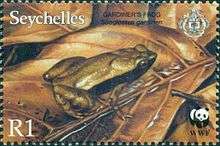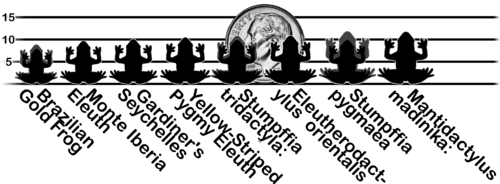Gardiner's Seychelles frog
| Gardiner's frog | |
|---|---|
 | |
| Scientific classification | |
| Kingdom: | Animalia |
| Phylum: | Chordata |
| Class: | Amphibia |
| Order: | Anura |
| Suborder: | Neobatrachia |
| Family: | Sooglossidae |
| Genus: | Sechellophryne |
| Species: | S. gardineri |
| Binomial name | |
| Sechellophryne gardineri (Boulenger, 1911) | |
Gardiner's frog (Sechellophryne gardineri) is a small frog of the family Sooglossidae and endemic to the Seychelles.
Description
Gardiner's frog is one of the smallest frogs in the world, reaching a maximum length of 11 millimetres (0.4 in). Newly hatched frogs measure only 3 millimetres (0.1 in) in length. Adult males are only 8mm long. It is brown in color, and has a dark stripe running from its mouth to its legs.

This frog is notable for its ability to hear despite the absence of a middle ear cavity. Research has shown that the species is able to use its mouth cavity to amplify sound and transmit it to the inner ear.[2]
Ecology and behavior
Gardiner's frog is a terrestrial frog, feeding on small invertebrates including mites, sciarid larvae, ants, and amphipods. It is restricted to the high- and mid-altitude areas of Mahé and Silhouette Islands of the Seychelles group. This is unusual among the Sooglossidae, as most are restricted to the high altitudes, which have a stable climate due to constant mist.[3] Eggs are laid in small clumps on moist ground and hatch as fully formed small adult frogs.[3] Although Gardiner's frog is secure in the regions in which it is found, it is classified as vulnerable by the IUCN Red List because it is restricted to only five localities.
References
- ↑ IUCN SSC Amphibian Specialist Group (2013). "Sechellophryne gardineri". IUCN Red List of Threatened Species. IUCN. 2013: e.T20380A15181011. doi:10.2305/IUCN.UK.2013-1.RLTS.T20380A15181011.en. Retrieved 27 August 2016.
- ↑ Renaud Boistel et al., How minute sooglossid frogs hear without a middle ear, Advance Online Publication PNAS Early Edition 2 September 2013.
- 1 2 "Gardiner's tree frog - Sooglossus gardener". ARKive. Retrieved 2016-04-09.
External links
- "Nature Seychelles - environmental conservation organisation - Sooglossidae frogs". Retrieved 2006-06-05.
- "Global Amphibian Assessment - Detailed Report". Retrieved 2006-06-05.
- "Froglog 40-5". Retrieved 2006-06-05.
- Monitoring and research into Seychelles amphibians and reptiles
